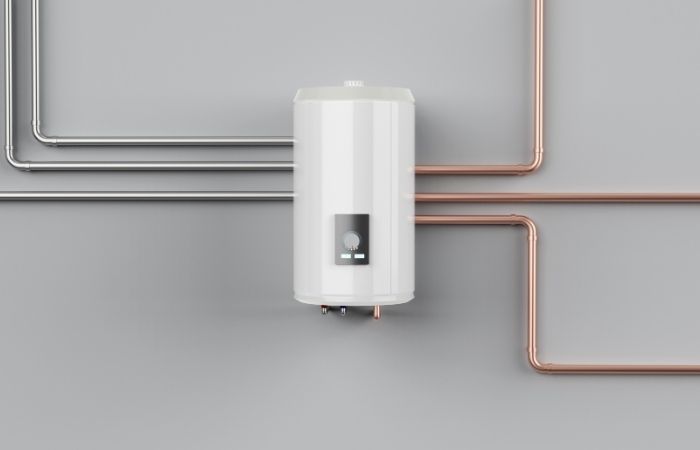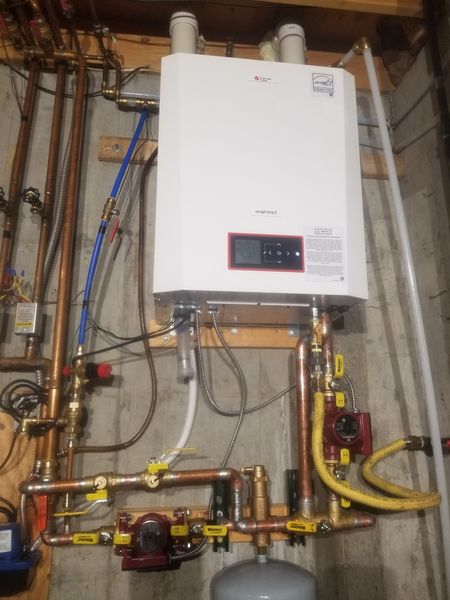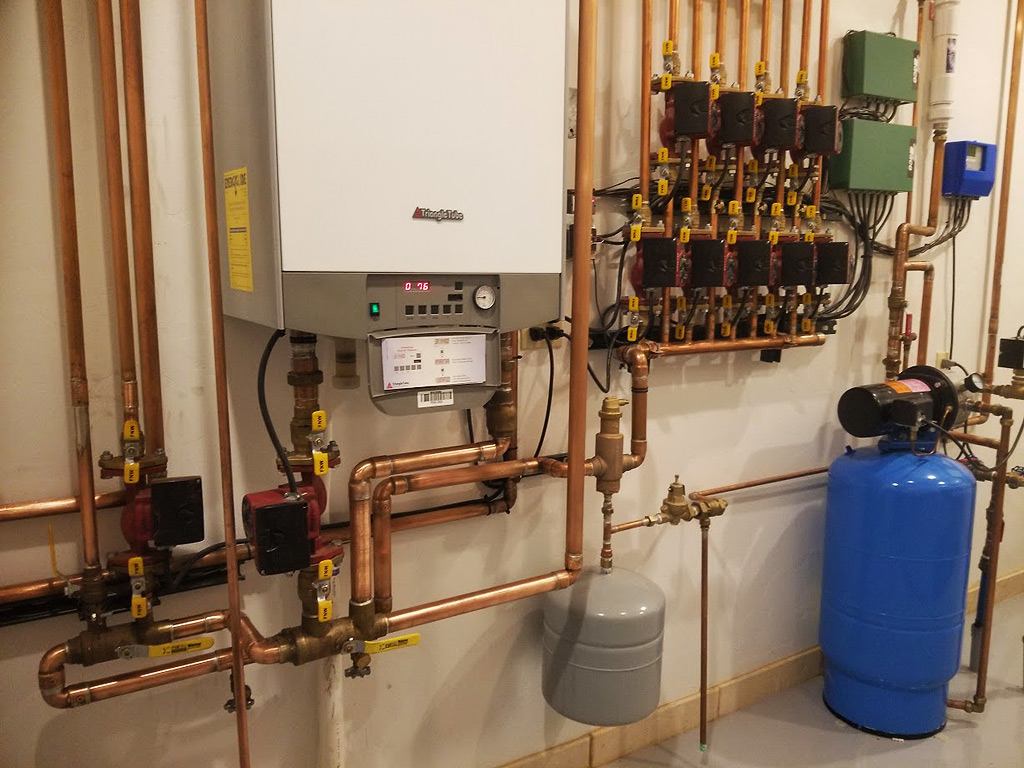Why Does My Boiler Keep Losing Pressure?

Pressure loss could be an issue with boilers, though, and there's plenty you can do to solve this. However, in order to do so, understanding why your boiler keeps losing pressure is important.
In this piece, we'll go over the most common reasons of boiler pressure loss, how to remedy them, and when to call a professional to keep your boiler functioning properly.
But First,
Sinrom Construction is the most trusted name when it comes to Boilermaintenance and service in Conifer. We offer a wide variety of services including checking and rectifying your boiler pressure, ensuring you have the most reliable system.
Call us today at (970) 389-2501 today to book our services.
Common Causes of Boiler Pressure Loss
There are many reasons why your boiler pressure keeps dropping, so your first step should be to learn how to identify them. Once you do that, you'll be ready to address the issue.
Leaks
Leaks are one of the most common reasons behind low boiler pressure, and while big leaks are usually very easy to spot, smaller leaks can be harder to find, as they can be inside the pipes or the boiler itself.
Undetected leaks can gradually drain water from the system, which in turn can cause your boiler's pressure to keep dropping, even without any visible indicators.
A quick way of spotting leaks in your boiler is by using the paper towel test. Here’s how you can do it:
- Turn Off the Boiler: Before starting, make sure your boiler is turned off and the system has cooled down.
- Inspect Visible Pipes and Connections: Look around the boiler for any visible signs of water leakage, such as water pooling, rust, or dampness around the joints, valves, and pipes.
- Paper Towel Test: Place dry paper towels or cloths under the suspected areas, like valves, joints, or radiators. Leave them in place for a few hours or overnight. If there’s a small, slow leak, the paper towel will absorb the water, making it easy to identify the location.
- Check the Pressure Relief Valve: This valve releases excess water when pressure is too high, so check if there is any dripping water coming from it. With age the spring tension gets old and starts losing small amounts of water. This is a maintenance item that should be inspected by an experienced professional.
If none of these tricks showed an issue, yet your boiler pressure is low, or if you'd rather hire professionals to inspect your boiler, we can help you! We can find and repair hidden leaks to prevent further pressure loss or even system damage.
Faulty Expansion Vessel
Your boiler's expansion vessel is what keeps the pressure steady, so if it's at fault, your boiler pressure will keep dropping.
Typically, this causes the boiler pressure to drop rapidly right after heating up, and you may even notice that refilling the boiler doesn't work like it used to.
If this is your problem, then you need to replace your expansion vessel. If you suspect this is the case, give us a call. In our more than 25 years of experience, we've seen just about anything that can happen to an expansion vessel, so we know when there's room for repairs, and when the only solution is to replace.
Faulty Relief Valve
If your boiler becomes over-pressurized, its pressure relief valve releases water to help reduce the internal pressure. When this valve fails, it can release pressure too late or too early, which might be the reason behind your boiler losing pressure with no leaks.
Replacing a pressure relief valve isn't easy, because you gotta make sure it's done right, or else, you'll end up right where you started, or get scalded so let us inspect that valve for you. Remember that the boiler is under pressure and hot.
Air in the System
Every now and then, air can can get trapped in the radiators or pipes, and as they warm, said air expands, reducing the amount of water inside them.
This can lead to your boiler losing pressure, even though, at first glance, your boiler will look like there are no problems.
Temperature Changes
It may come as a surprise, but temperature fluctuations can reduce the pressure in your boiler, especially during the winter.
While this increase and decrease in pressure is normal, extreme fluctuations are not, so if you notice that your boiler pressure keeps dropping no matter the season, then temperature changes are probably not to blame.
Regular boiler maintenance can help identify any problems before the weather starts changing, so it pays to perform regular maintenance on your boiler.
Inspections and maintenance should be done at least once a year, just to make sure everything is in order, and you can do that by yourself or hire us to do it.
We offer comprehensive boiler maintenance services designed to keep your system running efficiently and prevent unexpected breakdowns.
As part of our standard maintenance, we check the boiler for leaks and components and make sure the pressure is right.
How to Check and Fix Low Boiler Pressure

Most boilers have it on the front for easy access, and this gauge will show you whether the system’s pressure is within the ideal range, which is usually between 11 and 12 psi. Please reference your owner’s manual for your specific boiler.
If you've noticed that the pressure is too low, the next step is refilling the boiler, which is a fairly simple process that involves using the filling loop to add water back into the system.
First, turn off the boiler and allow it to cool. Then, locate the filling loop (usually in line with the expansion vessel), open the valves to let water in, and monitor the pressure gauge.
Once the gauge reads between 11 and 12 psi, close the valves and turn the boiler back on.
Following these steps will usually solve the issue. However, if you notice that your boiler pressure keeps dropping even after doing this, give us a call.
Whether it's a leak you can't detect, a defective valve, or something else entirely, we can identify the problem and get your boiler back up and running quickly.
Sinrom Construction Boiler Services

Amongst our many services, we offer a full range of boiler solutions, including:
- Boiler Repairs: From minor fixes to more complex issues, we have the expertise to diagnose and repair any boiler problem.
- Boiler Maintenance: Regular maintenance can prevent pressure-related issues and extend the life of your boiler.
- Boiler Replacements: If your system is outdated or inefficient, we can replace it with a modern, energy-efficient boiler that will save you money on energy bills.
Our team is highly trained, certified, and dedicated to providing excellent customer service. Whether you need a quick fix or a full system upgrade, give us a call to schedule a consultation or service call. We’re here to help.
FAQs
Is Low Boiler Pressure Dangerous?
Low boiler pressure is not dangerous, but it can have a negative impact on the boiler's overall heat efficiency. What's more low boiler pressure puts needless strain on your boiler's components, which can lead to faster deterioration and a shorter overall lifespan.
How long does it take for Sinrom Construction to repair a boiler losing pressure?
Minor fixes like refilling or replacing a valve can often be completed within a few hours.
However, if more extensive repairs are needed, it might take a bit longer. Rest assured, we at Sinrom Construction are committed to resolving your boiler issues as quickly and efficiently as possible.
Can my boiler still work if the pressure is too low?
If your boiler’s pressure is too low, it will stop to function until the situation is rectified, but the heating will likely be less efficient, and the hot water supply may become inconsistent.
Over time, the boiler may stop working entirely, so it’s important to address low pressure as soon as possible.
What should I do if there’s no visible leak, but my boiler is losing pressure?
If your boiler is losing pressure but no leak is visible, it’s possible that the issue lies within the boiler’s internal components, like the pressure relief valve or expansion vessel or a cracked heat exchanger.
Hidden leaks in the pipework could also be the cause. If you believe hidden leaks may be causing your boiler’s pressure loss, don’t hesitate to call us for an inspection!
Does Sinrom Construction offer emergency boiler services?
Yes, we do! At Sinrom Construction, we understand that heating issues can’t always wait. That’s why we offer emergency services to ensure your boiler gets the attention it needs as quickly as possible.
Whether your system has lost pressure, stopped working, or you’re experiencing another urgent issue, don’t hesitate to reach out—we’ll be there to help.
